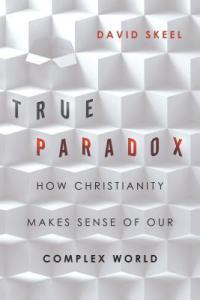
Summary: David Skeel argues that far from being a problem for Christians, the complexity of the world is in fact something best explained by the Christian faith. This book is helpful both for the person considering whether it makes sense to become a Christian as well as for Christians looking for ways to articulate how Christian faith makes sense of life’s deepest questions.
Many people consider that Christians are “simple minded” and that anything that is complex or poses intellectual challenges is problematic to the Christian believer. David Skeel takes an approach that is different from the very logical appeals of many apologists who appeal to cosmological arguments and arguments from design to demonstrate the case for Christian faith. Skeel argues that Christianity’s explanatory power to deal with the intangibles and paradoxes of the world as we actually experience it is greater than the materialist explanations that are the major alternative on offer.
Following his introduction where he lays out this basic premise, he discusses five aspects of life for which this is so:
- Ideas and our Idea Making Capacity. Our idea of a cosmos ordered by God is far more than evolutionary survival alone warrants. He observes the interesting phenomenon of the unreasonable usefulness of mathematics, where equations end up mapping the physical world. There is also in this the challenging question for a true religion of articulating ideals of universal applicability and transformative power that transcends the world of particulars and difference. Skeel argues that the testimony of Christians from every culture is powerful argument for its capacity to handle this kind of complexity.
- Beauty and the Arts. Skeel contends that the appreciation of beauty and art as an accidental consequence of evolution is profoundly dissatisfying. Beauty points beyond the world, which often also has a certain ugliness, a sense of the world not being as it should. Christianity deals with the complexity of world not as its supposed to be and our longing for and sense of beauty.
- Suffering and Sensation. No where do we have a greater sense of a world not as it ought to be than in our experience of pain and suffering. Yet materialist explanations simply say that suffering is. Here, Skeel writes touchingly of his friend Bill Stuntz, with whom he planned to write this book, and Bill’s struggle with terminal colon cancer. He concludes the chapter with Stuntz’s words of God’s longing for the sufferer: “God is the Lover who will not rest until his arms enfold the beloved. . . .So I have found in the midst of pain and heartache and cancer” (p. 107).
- The Justice Paradox. David Skeel is a lawyer and here he observes that every society creates a justice system to bring about a more just social order–and all fail in varying degrees. Marxists thought they would eliminate greed when the working class gained control. After Civil Wars, Constitutional Amendments and Civil Rights legislation, racism remains a reality in America. Christian faith understands the limits of law to deal with human imperfection, that law serves best with a “light touch” and that reconciliation in Christ may accomplish what law cannot in the fabric of human relationships.
- Life and Afterlife. Here Skeel explores both our longing and disdain for heaven. True Christian hope brings earth and heaven together in a renewed creation where the beauties we have created and the justice we have pursued carry over with us and are perfected with us in this new creation.
He concludes with a word for the person willing to explore Christianity further, commending further reading, participating in Christian community, seeking the counsel of a thoughtful Christian about one’s questions, and finally, reading the Bible itself.
What I most appreciated about this book is Skeel’s approach of lifting the “case for Christianity” out of the realm of philosophical argument and evidence-based discussion. These have their place but what Skeel does is explore the large and complex canvas of life and his contention that Christianity in fact has the greatest capacity to cope with the complexity of that canvas.
An interesting back story to this book is that it was discussed and edited with the help of an atheist post-doctoral student, Patrick Arsenault, who is mentioned in the Acknowledgments. The story of this dialogue was covered in a recent New York Times article. My only critique is the thought that it would have been interesting to see the dialogue between the two more directly reflected in this book, which is only in Skeel’s voice. Otherwise, I found this an account that by turn was thought-provoking, eloquent, and tenderly human in its exploration of life’s big complexities and the life of faith.
Editor’s Note: Bob Trube first posted the above review on Bob on Books. As you may remember, in addition to highlighting True Paradox: How Christianity Makes Sense of Our Complex World on Facebook/Twitter, the Emerging Scholars Network noted in Living Toward Shalom that Is Justice Possible? — Veritas Forum at the University of Pennsylvania with David Skeel, Rogers Smith, and Robert Ghrist (October 22, 2014. 1:28:24) — was one of the resources shared by colleagues at this spring’s Graduate and Faculty Ministries staff team meetings. As you have suggestions of material for highlighting, sharing, and discussing among Emerging Scholars as we continue to grow and deepen our learning community, please comment below and/or forward to us. Thank-you! To God be the glory! ~ Thomas B. Grosh IV, Associate Director, Emerging Scholars Network
Bob Trube is Associate Director of Faculty Ministry and Director of the Emerging Scholars Network. He blogs on books regularly at bobonbooks.com. He resides in Columbus, Ohio, with Marilyn and enjoys reading, gardening, choral singing, and plein air painting.

Leave a Reply